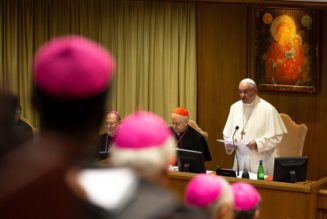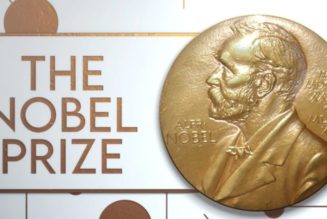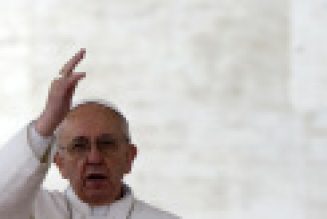
Today is the last solemnity in the Lenten season until we get to the Solemnity of All Solemnities on April 20. Still, today’s solemnity sets the course for what we will celebrate on Easter Sunday. It is a day when the Church gathers to pray and remember when Christ became incarnate within the womb of the Blessed Virgin Mary. It is this day when the Angel Gabriel appears to Our Lady and although confused at first by the angel’s announcement, she boldly proclaims her Fiat – her yes, be it done unto me according to thy word.
To commemorate this amazing Solemnity, here are 10 quotes from Pope Saint John Paul II that express the beauty of God’s divine plan through Mama Mary at the Annunciation –
1. “Like Abraham, Mary must walk through darkness, in which she must simply trust the One who called her. Yet even her question, “How can this come about?”, suggests that Mary is ready to say yes, despite her fears and uncertainties. Mary asks not whether the promise is possible, but only how it will be fulfilled. It comes as no surprise, therefore, when finally she utters her fiat: “I am the handmaid of the Lord. Let what you have said be done to me” (Lk 1:38). With these words, Mary shows herself the true daughter of Abraham, and she becomes the Mother of Christ and Mother of all believers.”
2. “Today we want to thank God in a special way for the gift of salvation, which Christ brought to the world by his Incarnation: “Et Verbum caro factum est – The Word became flesh”. From contemplation of this mystery all believers can draw renewed spiritual energy for proclaiming and constantly bearing witness to Christ, our only salvation, and for faithfully serving the “Gospel of life” that he entrusts to us.”
3. “Let us imitate Mary, who accepted the Word of God with faith, and allowed it to take root in her heart, so that it might bear fruit in her life.”
4. “…the fundamental interior attitude of the Blessed Virgin with regard to God: her faith. Mary believed! She believed in the Lord’s words, transmitted to her by the Angel Gabriel; at the Annunciation, her pure heart, already given entirely to God from her childhood, dilated in the generous and unconditional “Fiat” with which she agreed to become the Mother of the Messiah and Son of God.”
5. “Since she is associated with the Mystery of the Incarnation, Our Lady shares in the Mystery of the Redemption. Herfiat, which we will commemorate tomorrow, echoes that of the Incarnate Word. In close harmony with the fiat of Christ and of the Virgin, each one of us is called to say our own “yes” to the mysterious designs of Providence. Indeed, that joy and true peace which all ardently hope for even in our times only springs forth in full acceptance of the divine will.”
6. “The whole Annunciation dialogue reveals the essential dimension of the event, namely, its supernatural dimension (***).Grace never casts nature aside or cancels it out, but rather perfects it and ennobles it. Therefore the “fullness of grace” that was granted to the Virgin of Nazareth, with a view to the fact that she would become “Theotókos”, also signifies the fullness of the perfection of” what is characteristic of woman”, of “what is feminine”. Here we find ourselves, in a sense, at the culminating point, the archetype, of the personal dignity of women.”
7. “Motherhood is linked to the personal structure of the woman and to the personal dimension of the gift: “I have brought a man into being with the help of the Lord” (Gen 4:1). The Creator grants the parents the gift of a child. On the woman’s part, this fact is linked in a special way to “a sincere gift of self”. Mary’s words at the Annunciation – “Let it be to me according to your word” – signify the woman’s readiness for the gift of self and her readiness to accept a new life.”
8. “The Annunciation, therefore, is the revelation of the mystery of the Incarnation at the very beginning of its fulfillment on earth. God’s salvific giving of himself and his life, in some way to all creation but directly to man, reaches one of its high points in the mystery of the Incarnation. This is indeed a high point among all the gifts of grace conferred in the history of man and of the universe: Mary is “full of grace,” because it is precisely in her that the Incarnation of the Word, the hypostatic union of the Son of God with human nature, is accomplished and fulfilled.”
9. “As we contemplate each mystery of her Son’s life, she invites us to do as she did at the Annunciation: to ask humbly the questions which open us to the light, in order to end with the obedience of faith: “Behold I am the handmaid of the Lord; be it done to me according to your word” (Lk 1:38).”
10. In the salvific economy of God’s revelation, Abraham’s faith constitutes the beginning of the Old Covenant; Mary’s faith at the Annunciation inaugurates the New Covenant. Just as Abraham “in hope believed against hope, that he should become the father of many nations” (cf. Rom. 4:18), so Mary, at the Annunciation, having professed her virginity (“How shall this be, since I have no husband?”) believed that through the power of the Most High, by the power of the Holy Spirit, she would become the Mother of God’s Son in accordance with the angel’s revelation: “The child to be born will be called holy, the Son of God” (Lk. 1:35)
Pope Saint John Paul II…Pray for Us








